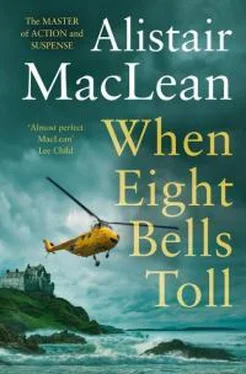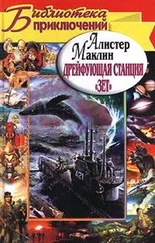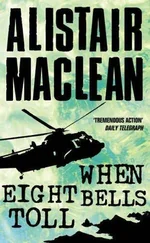‘But – but look at his face, man. We can’t leave–’
‘You look at this, sir.’ I stooped and picked up the weapon that had fallen from the man’s hand as I’d dropped him to the floor. ‘This is what is technically known to the United States’ police departments as a whippet. A shot-gun with two-thirds of the barrel and two-thirds of the stock sawn off. If he’d got you first, you wouldn’t have any face left at all. I mean that literally. Do you still feel like playing Florence Nightingale to the fallen hero?’ That wasn’t at all the way one should talk to Uncle Arthur, there would be a few more entries in the confidential report when we got back. If we got back. But I couldn’t help myself, not then. I passed by Uncle Arthur and went out.
In the wheelhouse I picked up a small torch, went outside and shone it down into the water, hooding it with my hand so that the beam couldn’t have been seen fifty yards away. They had a rubber dinghy, all right – and an outboard motor attached. The conquering heroes, bathed in that warm and noble glow of satisfaction that comes from the comforting realisation of a worthwhile job well done, had intended to make it home the easy way.
Looping a heaving line round the outboard’s cylinder head and hauling alternately on the heaving line and painter, I had both dinghy and outboard up and over in two minutes. I unclamped the outboard, lugged the dinghy round to the other side of the superstructure, the side remote from the inner harbour, and examined it carefully in the light of the torch. Apart from the manufacturer’s name there was no mark on it, nothing to indicate to which craft it belonged. I sliced it to ribbons and threw it over the side.
Back in the wheelhouse, I cut a twenty-foot length from a roll of P.V.C. electric wiring cable, went outside again and lashed the outboard to the dead man’s ankles. I searched his pockets. Nothing, I’d known there would be nothing, I was dealing with professionals. I hooded the torch and looked at his face. I’d never seen him before. I took from him the pistol still clutched in his right hand, undid the spring clips holding the guard-chains in place above the gunwale slots for our companion-way ladder, then eased, first the outboard, and then the man, over the side. They vanished into the dark waters of Torbay harbour without the whisper of a splash. I went inside, closing wheelhouse and saloon doors behind me.
Uncle Arthur and the injured man had reversed positions by this time. The man was on his feet now, leaning drunkenly against the bulkhead, dabbing his face with a blood-stained towel Uncle Arthur must have found, and moaning from time to time. I didn’t blame him, if I’d a broken nose, most of my front teeth displaced and a jaw that might or might not have been fractured, I’d have been moaning too. Uncle Arthur, gun in one hand and some more of my Scotch in the other, was sitting on the settee and contemplating his bloody handiwork with an odd mixture of satisfaction and distaste. He looked at me as I came in, nodded towards the prisoner.
‘Making a fearful mess of the carpet,’ he complained. ‘What do we do with him?’
‘Hand him over to the police.’
‘The police? You had your reservations about the police, I thought.’
‘Reservations is hardly the word. We have to make the break some time.’
‘Our friend outside, as well?’
‘Who?’
‘This fellow’s – ah – accomplice.’
‘I threw him over the side.’
Uncle Arthur made the mess on the carpet even worse. He spilt whisky all over it. He said: ‘You what?’
‘There’s no worry.’ I pointed downwards. ‘Twenty fathoms and thirty pounds of metal attached to his ankles.’
‘At – at the bottom of the sea?’
‘What did you expect me to do with him? Give him a state funeral? I’m sorry, I didn’t tell you, he was dead. I had to kill him.’
‘Had to? Had to?’ He seemed upset. ‘Why, Calvert?’
‘There’s no “why.” There’s no justification needed. I killed him or he killed me, and then you, and now we’d both be where he is. Do you have to justify killing men who have murdered at least three times, probably oftener? And if that particular character wasn’t a murderer, he came to-night to murder. I killed him with as little thought and compunction and remorse as I’d have tramped on a black widow spider.’
‘But you can’t go around acting like a public executioner.’
‘I can and I will. As long as it’s a choice between them and me.’
‘You’re right, you’re right.’ He sighed. ‘I must confess that reading your reports of an operation is quite different from being with you on one. But I must also confess that it’s rather comforting having you around at times like this. Well, let’s put this man in cells.’
‘I’d like to go to the Shangri-la first, sir. To look for Hunslett.’
‘I see. To look for Hunslett. Has it occurred to you, Calvert, that if they are hostile to us, as you admit is possible, that they may not let you look for Hunslett?’
‘Yes, sir. It’s not my intention to go through the Shangri-la , a gun in each hand, searching for him. I wouldn’t get five feet. I’m just going to ask for him, if anyone has seen him. Assuming they really are the bandits, don’t you think it might be most instructive, sir, to observe their reactions when they see a dead man walking aboard, especially a dead man coming alongside from a boat to which they’d shortly beforehand dispatched a couple of killers? And don’t you think it will become more and more instructive to watch them as time passes by with no sign of First and Second Murderers entering left?’
‘Assuming they are the bandits, of course.’
‘I’ll know before we say good-bye to them.’
‘And how do we account for our knowing one another?’
‘If they’re white as the driven snow, we don’t have to account to them. If they’re not, they won’t believe a damned word either of us say anyway.’
I collected the roll of flex from the wheelhouse and led our prisoner to the after cabin. I told him to sit down with his back to one of the bulkhead generators and he did. Resistance was the last thought in his mind. I passed a few turns of flex round his waist and secured him to the generator: his feet I secured to one of the stanchions. His hands I left free. He could move, he could use the towel and the bucket of cold fresh water I left to administer first aid to himself whenever he felt like it. But he was beyond reach of any glass or sharp instrument with which he could either free himself or do himself in. On the latter score I wasn’t really worried one way or another.
I started the engines, weighed anchor, switched on the navigation lights and headed for the Shangri-la. Quite suddenly, I wasn’t tired any more.
Six
Wednesday: 8.40 p.m. – 10.40 p.m.
Less than two hundred yards from the Shangri-la the anchor clattered down into fifteen fathoms of water. I switched off the navigation lights, switched on all the wheelhouse lights, passed into the saloon and closed the door behind me.
‘How long do we sit here?’ Uncle Arthur asked.
‘Not long. Better get into your oilskins now, sir. Next really heavy shower of rain and we’ll go.’
‘They’ll have had their night-glasses on us all the way across the bay, you think?’
‘No question of that. They’ll still have the glasses on us. They’ll be worried stiff, wondering what the hell has gone wrong, what’s happened to the two little playmates they sent to interview us. If they are the bandits.’
‘They’re bound to investigate again.’
‘Not yet. Not for an hour or two. They’ll wait for their two friends to turn up. They may think that it took them longer than expected to reach the Firecrest and that we’d upped anchor and left before they got there. Or they may think they’d trouble with their dinghy’ I heard the sudden drumming of heavy rain on the coach-roof. ‘It’s time to go.’
Читать дальше
Конец ознакомительного отрывка
Купить книгу









